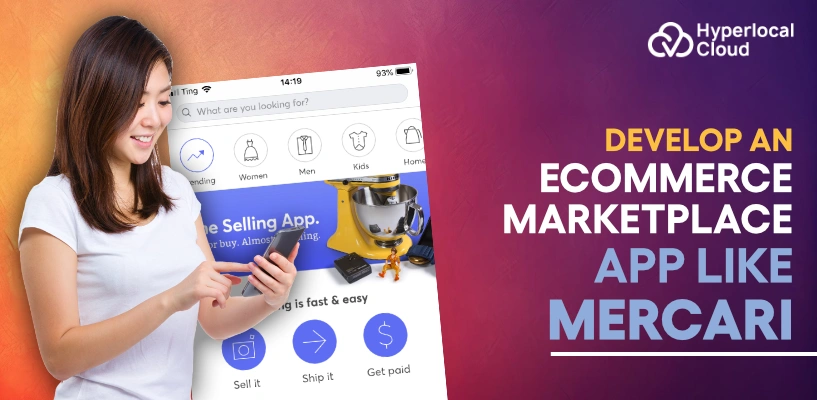How To Develop An Ecommerce Marketplace App Like Mercari

In today’s digital age, ecommerce marketplaces have become a lucrative business model, connecting buyers and sellers in a convenient and efficient manner. Mercari Clone a platform that provides a wide range of products and services, catering to consumers’ diverse needs and preferences. One such successful marketplace is Mercari, which has revolutionized the way people buy and sell used items.
Suppose you are interested in developing your own ecommerce marketplace app like Mercari. In that case, this comprehensive step-by-step guide will provide you with the necessary insights and strategies to get started.
Success Of Mercari Ecommerce Marketplace
Before diving into the development process, it is crucial to understand why Mercari has been so successful. One of the key factors contributing to its popularity is the seamless user experience it offers.
Mercari has a user-friendly interface that enables users to list items for sale, browse through a vast selection of products, and make secure transactions effortlessly. Moreover, Mercari’s focus on building trust among its users through a robust rating and review system has played a significant role in its success. By analyzing the strengths of Mercari, you can incorporate similar features and functionalities into your own marketplace app.
Growth In C2C Ecommerce Marketplace
Is the future of the eCommerce marketplace lucrative? Let’s know:
- The C2C eCommerce marketplace is growing and is anticipated to reach $25,04,00.00 million before 2024.
- The compound annual growth rate for this segment is 23.8%.
- Furthermore, it is expected to reach $86,20,87.00 before 2031.
Build Your Online Ecommerce Within Minutes Now!
How To Develop An ECommerce Marketplace App Like Mercari?
Market Research And Competitor Analysis
Before embarking on the development process, thorough market research and competitor analysis are essential. Evaluate existing ecommerce marketplaces and identify their strengths and weaknesses. Analyze their user base, revenue models, marketing strategies, and pricing structures. This information will help you make informed decisions and differentiate your marketplace app from the competition.
Additionally, conduct surveys and gather feedback from potential users to understand their needs and preferences. By identifying gaps in the market and addressing them through your marketplace app, you can gain a competitive edge.
Choosing The Right Technology Stack
Selecting the right technology stack is crucial for the successful development of your ecommerce marketplace app. Consider factors such as scalability, security, performance, and development speed when choosing your technology stack.
Some popular choices include Ruby on Rails, Node.js, React Native, and MongoDB. Each technology has its own advantages and disadvantages, so it is important to assess your project requirements and consult with experienced developers to make an informed decision. Additionally, consider integrating third-party APIs for features such as payment gateways and geolocation services.
Designing The User Interface And User Experience
An intuitive and visually appealing user interface (UI) is essential for attracting and retaining users. Collaborate with experienced designers to create a UI that is both aesthetically pleasing and easy to navigate. The design should be consistent with your brand identity and incorporate elements that enhance the user experience (UX).
Developing The Core Functionality
Once the design phase is complete, it is time to focus on developing the core functionality of your marketplace app. This includes features such as user registration and authentication, product listing and management, search and filter options, and secure transactions. Collaborate with experienced developers to ensure the smooth implementation of these features.
Consider using an agile development methodology to break down the development process into manageable sprints. Regularly test and iterate on the functionality to identify and fix any bugs or issues. Continuous communication between the development team and stakeholders is crucial to ensure the app meets the desired requirements.
Secure Payment Gateways & Transactions
Implementing secure payment gateways is a critical aspect of developing an ecommerce marketplace app. Users need to have confidence that their financial information is protected when making transactions. Integrate popular payment gateways such as PayPal, Stripe, or Braintree to provide users with a seamless and secure payment experience.
Ensure that the integration is compliant with industry standards and regulations. Implement encryption protocols to protect sensitive user data and regularly conduct security audits to identify and mitigate potential vulnerabilities. Building trust in the security of your marketplace app is essential for its success.
Testing/Quality Assurance
Before launching your ecommerce marketplace app, it is crucial to thoroughly test and ensure its quality. Conduct comprehensive testing to identify any bugs, errors, or performance issues. Test the app on different devices, operating systems, and network conditions to ensure compatibility and responsiveness.
Additionally, perform user acceptance testing to gather feedback from real users and make necessary improvements. Quality assurance should be an ongoing process to maintain the functionality and user experience of your app. Regularly update and optimize the app based on user feedback and market trends.
Launch The Marketplace App Like Mercari
After the development and testing phases are complete, it is time to launch your ecommerce marketplace app. Plan a strategic launch strategy to create buzz and generate initial traction. Leverage social media platforms, influencer marketing, and email marketing to reach your target audience.
Consider offering incentives such as discounts or referral programs to encourage user engagement. Monitor user feedback and address any issues or concerns promptly. Continuously analyze user data to gain insights and make data-driven decisions to optimize the app’s performance.
Marketing & Promotions
To ensure the success of your ecommerce marketplace app, it is essential to implement effective marketing and promotion strategies. Utilize various marketing channels such as social media, search engine optimization, content marketing, and paid advertising to reach a wider audience.
Collaborate with influencers and bloggers in your niche to increase brand awareness. Implement referral programs and incentivize users to promote your app to their network. Regularly analyze marketing metrics such as user acquisition, conversion rates, and customer lifetime value to optimize your marketing efforts.
Timely Maintenance
Once your ecommerce marketplace app like Mercari is launched, the journey does not end there. Regular maintenance and updates are crucial to ensure the app’s performance, security, and user experience. Continuously monitor user feedback and analyze app usage metrics to identify areas for improvement.
Regularly update the app to fix any bugs, enhance existing features, and introduce new functionalities. Stay updated with the latest industry trends and technologies to remain competitive. Additionally, invest in customer support to address user queries and concerns promptly. By maintaining and updating your app, you can retain existing users and attract new ones.
Have An Idea For A Mercari Clone App?
Must-Have Features In A Mercari Clone
Login/Signup
This feature lets buyers and sellers log in or sign up with their own identity. It also incorporates social media accounts to provide one-click login support.
Advance Searching
Buyers can easily filter their search by applying categories, items they are looking for, price range, latest arrivals, and many more.
Product Information & Insights
This feature lets customers check a product’s insight and some information like the most sold date, likes & comments, views, number of made purchases, etc.
Post Product
Sellers who want to sell a product can easily post by writing a description, uploading photos, setting a price range, etc.
Promote Button
This feature is useful for sellers who want their products to be listed at the top. It helps make listings more visible in search results and alert potential buyers.
User Verification
A Mercari clone verifies the account that resists spam user’s registration. The verification is done by mobile number and email ID using OTP.
Multi-Currency Option
An app like Mercari must be equipped to support every major currency to ease payment transactions between buyers and sellers.
Multi-Lingual Support
The multi-lingual support converts the entire Mercari clone’s script into the selected language preferred by the users.
Shopping Cart
A shopping cart is integrated to let buyers add multiple items and checkout at once. It calculates the overall payment and provides a seamless shopping experience.
Push Notification
The push notification advises buyers about the status of their purchased item. At the same time, sellers can receive updated information about their products and sales information.
Admin Dashboard
A Mercari-like app must adhere to a cutting-edge professional dashboard that must manifest live business happening in the form of stats, animations, charts, etc.
Communication
This feature is helpful in connecting buyers, sellers, and admins through calls and messages. It is a powerful feature.
Advantages Of Having A Mercari Clone
A Mercari clone app can offer several business benefits. Here are some mentioned benefits that business owners can avail:
Increased Market Reach
A Mercari clone app can help your business expand its market reach by targeting a wider audience and attracting more customers.
Cost-Effective Solution
Developing a Mercari clone app can be a cost-effective way to enter the online marketplace industry, as it eliminates the need to start from scratch.
Revenue Generation
The app can provide various revenue streams, such as commission fees on successful transactions, premium listings, and advertising opportunities, leading to increased profits.
Customer Engagement
A user-friendly Mercari clone app can enhance customer engagement, leading to higher customer retention and satisfaction.
Analytics And Insights
The app can provide valuable analytics and insights into customer behavior, preferences, and trends, helping businesses make informed decisions.
Overall, a Mercari clone app can offer numerous business benefits by providing a platform for buying and selling goods, attracting users, and generating revenue.
Money Making Strategies For An App Like Mercari
There are several ways for businesses to make money using a Mercari clone app. Here are some key strategies:
Commission Fees
Businesses can generate revenue by charging a commission on the successful transactions that take place through the app. This can be a percentage of the total sale amount.
Premium Listings
Sellers can promote their listings by paying a fee for increased visibility and priority placement within the app. This can provide an additional revenue stream.
Advertising Opportunities
Businesses can sell advertising space within the app to external businesses looking to reach the app’s user base. This can include banner ads, sponsored listings, or targeted promotions.
Subscription Plans
Businesses can provide premium subscription plans to sellers, providing access to advanced features, marketing tools, or additional support in exchange for a monthly or yearly fee.
Transaction Fees
In addition to commission fees, businesses can charge a small transaction fee for each sale through the app. The existing Mercari app charges a minimum of 10% transaction fee, but with a clone app, business owners can decide the amount of percentage.
By leveraging these strategies, businesses can effectively monetize a Mercari clone app and create a sustainable revenue stream.
Bottom Line
An eCommerce marketplace like Mercari has the right potential to uplift a business. As it comes from an already successful idea, it can offer vast revenue benefits. By applying the right monetization strategies and money-making models, entrepreneurs can generate income, expand their business reach, increase branding, etc. So whom to connect to get a Mercari clone?
You are at the right spot.
Hyperlocal Cloud is a suitable IT company for all of your business needs. We have 4+ years of experience in developing ecommerce applications of almost every industry. Our expert team of 150+ developers is professional in crafting a custom application or providing a clone of an existing business niche. Connect with our expert team and take the first step toward your vision.





